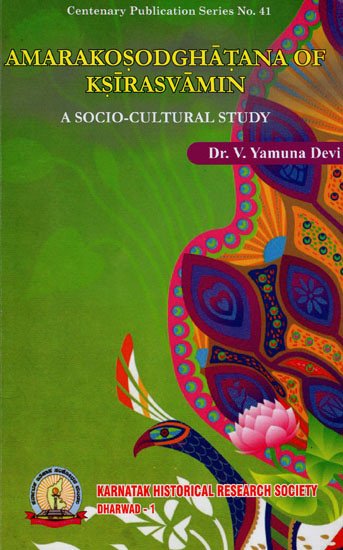Amarakoshodghatana of Kshirasvamin (study)
by A. Yamuna Devi | 2012 | 77,297 words | ISBN-13: 9788193658048
This page relates ‘Politics and Administration (6): Dangers’ of the study on the Amarakoshodghatana of Kshirasvamin (in English) which represents a commentary on the Amarakosha of Amarasimha. These ancient texts belong the Kosha or “lexicography” category of Sanskrit literature which deals with the analysis and meaning of technical words from a variety of subjects, such as cosmology, anatomy, medicine, hygiene. The Amarakosa itself is one of the earliest of such text, dating from the 6th century A.D., while the Amarakoshodghatana is the earliest known commentary on that work.
Politics and Administration (6): Dangers
Dangers affecting a country or a king are classified into three categories–adṛṣṭa, dṛṣṭa and ahibhaya.
(a) Adṛṣṭa (II. 8. 31; p. 182)–
[Unseen dangers:]
Amarakośa mentions unseen dangers such as from fire, water etc.
The others according to Kṣīrasvāmin may be such as evil spirits, thunderbolt etc–
ādiśabdāt piśācādi |
(b) Dṛṣṭa (II. 8. 31; p. 182)–
[Known or expected:]
Amarakośa mentions that a king could expect danger from one’s own country, the enemy country or from the circle of King’s.
Kṣīrasvāmin adding to the same mentions that of the expected fears are fear of robbers or forests–
svarāṣṭrāccaurāṭavikādibhayam |
According to Kṣīrasvāmin the danger from enemy country may be like setting fire or the like–
pararāṣṭrāddāhavilopādibhayaṃ ca |
(c) Ahibhaya (II. 8. 31; p. 182)–
[Latent fear:]
Kṣīrasvāmin explains latent fear as the fear from the prince comparing it to the fear when snake is at home:
svapakṣādrājaputrāderageriva gṛhasthitādbhayam |
(d) Īti (III. 3. 68; 255-86)–
[Calamity:]
Kṣīrasvāmin mentions six natural and other calamities as mentioned in M.Bh (V. 20) namely–1.Flood, 2. Drought, 3.Locusts, 4. Mice, 5. Parrots, 6. Foreign invasions:
ītir ḍimba pravāsayoḥ | īṅgatau ḍimba upadravaḥ yadāhuḥ—ātivṛṣṭirmūṣikāḥ śalabhāḥ śukāḥ | ātyasannāśca rājā ṣaḍetā ītayaḥ smṛtāḥ |
